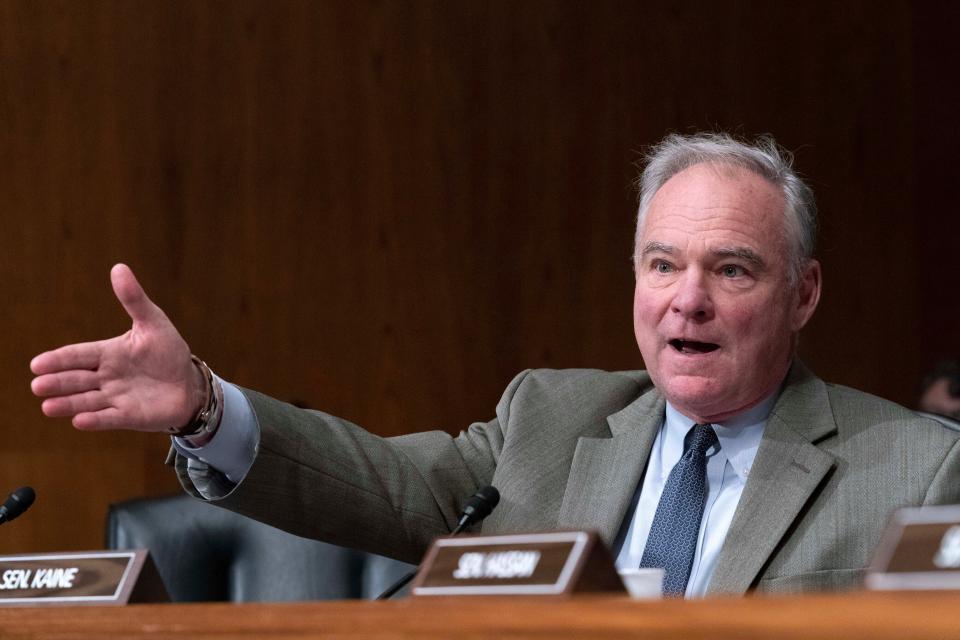'No. 1 crisis in America': Mayors warn Congress of a crisis 'in every neighborhood'
WASHINGTON − Talking about mental health was seen as a "dark, dirty secret" in Hillary Schieve’s family.
The Reno, Nevada, mayor grew up watching her family members suffer from depression and drug use. They never talked about the struggles because of the stigma surrounding mental illness and the need to "be like everyone else's family."
Three years ago, tragedy struck. Schieve lost her sister, her brother and her sister’s fiance to mental illness all within several months.
“It was a lot of tragedy in such a short period of time,” she told USA TODAY.
The mayor of the fourth-largest city in Nevada knew she needed to get help to cope with the loss. But when she made the difficult decision to reach out to a professional using a different name to avoid special treatment, she was told she couldn't be seen for six to eight weeks.
Schieve’s story underscores the difficulty local leaders face when combating a mental health crisis that is worsening in communities across the country. The causes range from homelessness to substance use to mental illness like depression to shortages of behavioral and mental health workers.
Mayors are often the elected officials closest to their communities and have had a front-row seat as to how the COVID-19 pandemic amplified the challenges many face when it comes to mental health. Struggling with increased demands, those leading America's cities are seeking a seat at the table to discuss the resources needed to address the problem at all levels of government.
According to a survey from the U.S. Conference of Mayors, 88% of mayors reported they do not have adequate access to the resources needed to address mental health. Additionally, 97% said requests for mental health services have increased in their city over the past two years.
“We want to address the challenge, but we also have to be realistic − there is no place to take the sickest people and that is tragic,” Schieve said.
A bipartisan group of mayors visited Capitol Hill this week to share with lawmakers the consequences of the mental health crisis in their cities and help craft ideas for how to best use funding to help solve the problems.
“We want to address it head on because we believe it’s the No. 1 crisis in America,” Schieve said.
'I'm going to lose it'

For Schieve, it was a tragic summer three years ago.
Her sister, Grady, who faced a lifelong battle with depression, received a Stage 1 breast cancer diagnosis that resulted in a double mastectomy.
Coupled with the death of her father six years earlier, the illness led her depression to spiral.
“I would much rather have cancer any day than depression,” Schieve recalled her sister telling her one day over the phone.
As her depression became debilitating, Grady stopped attending appointments for her cancer treatment. Schieve intervened to get her sister back into treatment where they learned the cancer had progressed to Stage 4. Grady spent four months living with Schieve before she died.
“She never, ever should have died from that,” Schieve said.
The death had a significant impact on Schieve’s brother, who had a history of drug use. Six weeks after her death, he didn’t answer his door. Schieve's other sister entered through the back and found him dead. His cause of death was ruled a secondary infection from using intravenous drugs.
Tragedy struck again. A few months later, Grady’s fiance called Schieve to say he was having difficulty coping with his fiancee's death. He had suffered from alcoholism and recovered, but he had relapsed.
He told Schieve he needed help, and she planned to meet him at the behavioral health hospital that day, but he never showed. Police did a welfare check and found him dead.
Schieve began to struggle herself, faced with the grief of losing three loved ones. But growing up with her family keeping mental illness a secret, she didn't want to share her struggles with others.
Simultaneously, Schieve led her city through a global pandemic, navigating COVID-19 as one of the first mayors in the state to shut down her city. Then came an uprising downtown with rioters protesting police brutality after the death of George Floyd. She felt the need to stay strong for her community.
“I felt so out of control, like how do you deal with this?” Schieve said.
The mayor said it was a tough decision, but eventually she reached out for help using a different name. She was told the soonest she could be seen was in six to eight weeks.
“I was like 'Oh my gosh, I think I’m going to lose it,'” she said.
Schieve knew that if she was having trouble getting help, so were others in Reno.
“I felt very mission-driven to talk about it, because what I realized once I did that, people reached out to me a lot and said, ‘Wow, that is exactly what happened in my family.'”
'A failed system'

Policies now in place to help those struggling with their mental health have failed, Schieve said.
“We’re telling everyone please go get help, but then there’s no one there to help them,” she said. “Then you feel like this failed system for people who are suffering from anxiety, depression, drug use.”
The problem doesn't stem from a lack of programs but their lack of effectiveness, Albany, New York, Mayor Kathy Sheehan said.
In Albany, Sheehan described how a person who is threatening violence may go to the emergency room where they can stay for 24 hours and get a prescription refilled but then are sent back out on the street. Once their prescription runs out, Sheehan said, they are often back where they started.
“We’re talking about it from a public safety standpoint, but what we need is a public health solution,” she said.
She emphasized the need for more behavioral health providers who can be available to respond to calls related to a mental health emergency instead of sending police officers.
“We need them in the streets," she said of mental health providers. "Not in an office that people have to go to between 9 and 5."
In Fresno, California, Mayor Jerry Dyer pointed to challenges distributing funding for mental health resources, suggesting a need to assess how money is being spent versus the needs mayors are identifying in local jurisdictions.
“We want a seat at the table to talk about the mental health crisis in the hopes that we can shape how dollars are being used in America today to treat this crisis,” said Dyer, who spent 40 years in the Fresno Police Department seeing firsthand what mental illness is doing to neighborhoods.
Sen. Kaine, members of Congress talk collaboration

Sen. Tim Kaine, D-Va., was the mayor of Richmond from July 1998 to September 2001. He said he has seen mental health challenges intensify amid the COVID-19 pandemic and the opioid epidemic.
The Virginia lawmaker said members of Congress rely on local and state officials to assess needs and identify gaps in resources.
"I'm a big believer that we should try to fund initiatives, but that the best uses of these funds are often developed in a granular way in local governments," he said.
Pandemic relief money from the CARES Act and the American Rescue Plan funneled money to states and local governments to support mental health programs, but the funding is set to expire in 2025.
"The mental health need isn't going away, and we have to understand the dimensions of it," Kaine said.
Rep. Norma Torres, D-Calif., a former mayor of Pomona, said there can often be a disconnect among the levels of government. For members of Congress and state legislators who are overburdened with budgets, it is challenging to hear directly from mayors about the needs in their cities. Torres also emphasized that not all money is sent directly to communities and is frequently funneled through states.
"I push hard for our cities to get direct funding from the federal government," she said, adding that states have different formulas that can make it challenging for funding to directly reach cities.
Also from California, Democratic Rep. Mark DeSaulnier served as the former mayor of Concord. The lawmaker witnessed his father struggle with depression and alcoholism that resulted in his suicide in 1989. DeSaulnier was the last family member to speak to his father.
A former juvenile probation officer in Boston, the California lawmaker said dispatchers in his district are trained when someone calls 911 to decide whether police will respond or full-time mental health professionals. He said the program works because of partnerships with mayors, school districts and nonprofits in his district.
‘I’m mindful of the finances, but it's supplying more grant funds but also helping them be sensitive to the pressure on their traditional funding requirements when (in) most local government, police are a big part of the budget,” he said.
Mayors find solutions: Talkspace memberships for the whole city

Mayors are using the resources they have to find solutions.
Schieve spent $1.3 million to buy Talkspace memberships for everyone in her city during the pandemic. Reno's population is about 270,000.
“I think those are the types of approaches to be proactive instead of reactive,” she said.
Programs to combat mental health struggles are being designed on a whole different level of government, she said, and they often don't solve the problems mayors see in their communities.
“We need to be at the table so you know what people need,” she said.
Steve Williams, mayor of Huntington, West Virginia, called mayors "conveners in chief" in their communities.
He created a crisis intervention team with 15 different agencies with support from the federal government and partnerships with the county and state.
“We’re not saying give us all the money to do it," he said. "Bring us to the table and we’ll be the architect to be able to design how this gets fixed and make sure that everybody is streamlined in such a way that we’re able to get things done."
'Happening in every neighborhood'

Schieve advocated to lawmakers on Capitol Hill for more transparency in allocating money for mental health resources before they are sent to the state.
“There’s so much more bureaucracy at the state level than there is on the local government side. We don’t really have time to waste because we are dealing with people’s lives and we are so close to people,” she said.
The federal government provides funding for mental health services to states and local governments through several funding sources, including:
The Health Resources and Services Administration through the Department of Health and Human Services.
The Substance Abuse and Mental Health Services Administration through the Department of Health and Human Services.
School Based Mental Health Service Grant Program through the Department of Education.
Crisis intervention funding through the Department of Justice.
“Hopefully, some of the colleagues and members of Congress in both the House and Senate will recognize that this is not a political issue," said Brian Wahler, mayor of Piscataway, New Jersey. "It’s an issue that needs to be dealt with, because it’s happening in every neighborhood in the United States.”
This article originally appeared on USA TODAY: Closer to the mental health crisis: Mayors combat 'failed system'

